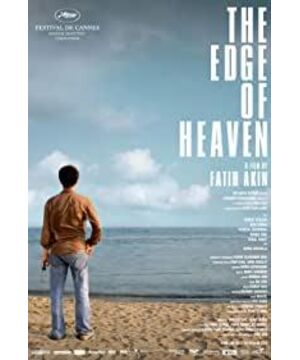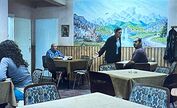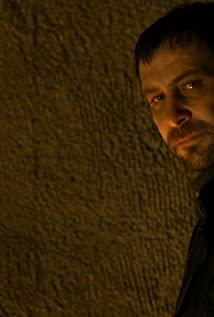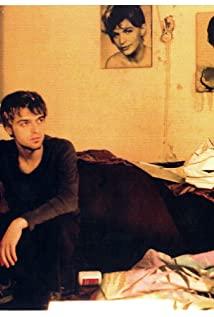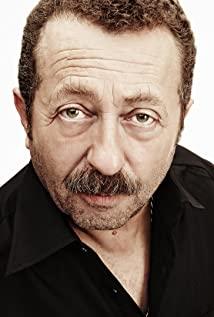The film is called "Edge of Paradise", which shows that the characters in the film are still wandering in the gap between ideal and acquaintance. Six people, each standing on the edge of uniqueness. The old man had lost his wife for many years and had difficulty raising his son alone. Perhaps it was this loneliness that gave him the disrespectful temperament. In contrast to him is his son, Najjar, who is a university professor: calm, restrained, traditional. The huge gap in character or concept between the two makes their communication always easy to break up. In such loneliness, the old man went to seek the comfort of a prostitute. The dim happiness can bring him a moment of warmth. But every time after returning home, the old man is still left with the cold reality that cannot be avoided. Therefore, the old man hopes that prostitutes can accompany him day and night, and make warmth a part of reality in his life. After several setbacks, she got her wish. At the dinner table that night, for the first time in years, he had so much to say. But the good times didn't last long. Years of loneliness caused him to have an irreparable estrangement from that warmth. In the face of resistance, he became angry, which he regarded as a betrayal. But what he didn't expect was that the outburst of his anger was so strong that it caused an irreparable fault. The prostitute is dead. When he was taken to the cold cell, he stood on the stool and looked out the bright and even dazzling window. At that moment, this stubborn old man showed his weakness and sadness and his almost confused yearning for life before our eyes. That window is like a separation between ideal and reality. Despite this yearning, the old man lingered. Compared with the elderly, prostitutes are simpler. She just wanted her daughter to finish college. For that, she doesn't care what to do. But she is still willing to tell her daughter that she works in a shoe store. He didn't care about the old man's request at first. But the threat of religious fanatics left her with no choice. Najal didn't accept her at first, and she didn't have any expectations for it. Instead, she explained her career to the other party in an attitude similar to "self-defeating", and her tone was clearly stubborn. But when she cried about her thoughts and difficulties for her daughter, she got Najal's understanding and tolerance. The sudden death buried her hope of reunion with her daughter, and the sense of responsibility for her daughter was transferred to Najal.
Antiy is a Turkish college student whose domestic inequality and the blind enthusiasm of young people make her a political radical. While paying the price for his choice, he is proud of this sacrifice. So she fled from Turkey to Germany, sleeping rough on the streets. She tried to find her mother, but she couldn't find it in the shoe store. Although the reality has given her a huge temper, she still sticks to her "ideal". until she met Lot. Unlike the mother who was "hated" by herself, Lott was a girl full of openness and idealism. She met Antiy and fell in love, and she was determined to help the girl who was persecuted by the Turkish government, and even went to Turkey for her alone. She was unfamiliar and faced a shortage of funds, but she still insisted on helping Antio. "This is the first time in my life that I have done such a meaningful thing!" she said to her mother who didn't understand her. After unremitting efforts, he finally met Antiy. Anti asked her to temporarily keep her stolen gun, but Lot was used by an ignorant street gangster on the way home to bring her short life to an end. Antiy is shocked by the news of his lover's death. She began to doubt her own beliefs. At this time, Lot's mother came to Turkey and found Antiy. She didn't blame Antio, and said that she was willing to inherit Lot's will to help her. Antiy was touched. She gave up her once firm belief in exchange for freedom, embarked on the road of reality, and embraced Lot's mother who was very dissatisfied with herself at the time. In that moment, sadness, understanding, and joy are intertwined. This is redemption in exchange for Lot's young life.
Nejar can be described as a "clue figure". Throughout the film, he does a connecting job. All people have a relationship with him. So through him, you can also lead to other people's stories. This arrangement made him appear constantly in the film: first, he showed the state of the old man and the mood of a prostitute; then he returned to his hometown of Turkey in order to find the daughter of the prostitute, and rented the house to Luo, who also came to Antioch. After Crowe died, her mother came and dominated the house where her daughter lived. In these people's stories, he is the foil. The only purpose of "finding Antio" was that he had not been able to achieve it after both of his two tenants had successfully met Antio. I have to say that the director deliberately put him in such a position. But we can also understand it as "his story is witnessing the story of others". In these witnesses, Najjar, who is not the client, may not have gained as little as the client. It was these testimony that made him firm in his determination to meet his father. In fact, there was a time when Nejal returned to his childhood town on the way to see his father, and met his old friend: now he is a single mother. The two fell in love. But in the end, it was removed because the scene was too long and not in harmony with the film as a whole. If there is this scene, the quality of the film may be richer.
The plot of the film is complicated, and the fate of the characters is interspersed with each other. However, the purposeful scene connection and ingenious arrangement make the audience not feel unclear. Not only that, the parallel narrative and overlapping scenes (characters) give the film more memorable details. When Antiy, who was looking for his mother, galloped past, we saw her mother on the bus that was just a short distance away; when Lot came to Turkey for Antioch, and went to and fro next to the sign "Looking for Antiy"; when Nejal asked Lot "Anti's name". When Lot lied to protect Anti, our hearts were tight. There is no tense plot, no music to enhance the atmosphere. But in these scenes, we all witnessed the intersection of characters and missed it under the ups and downs of our mood. The director created such a contrast between the inside and outside of the play through the foreshadowing of the plot and the peaceful narration, making the presence of the audience an important part of the film. When Mother Lot, who experienced the pain of bereavement, walked on the road that her daughter once walked, and greeted the people sitting on the side of the road like her daughter, we couldn't help but tremble in our hearts; when the film came to an end, we returned to the film At the beginning of the scene, I can't help but feel a sense of reincarnation. Through seemingly unintentional scene foreshadowing and character relationships like this, the director succeeded in turning the plain drama into a full-fledged charm. Turning the "narrative" of a traditional film into a part of "interaction" is exactly what makes this film brilliant.
Most of the time, the shots in the film are very rigorous. Emphasize the main body and have clear layers. Only when Lot's mother came to a hotel in Turkey with the news of her child's death, the wide-angle camera was clearly used. It reinforces the contrast between the magnificence of the room and the helplessness and sadness of the characters. And the mother, who had been very restrained in her emotional performance before this, was crying alone, her voice echoing in the empty room. A steady shot shakes strongly during the journey on Nejarta, highlighting the characters' psychological contradictions and sense of progression. And when Antiy was on the run, the camera was full of oppression. Colors are not deliberately emphasized or highlighted in the film, but they also add seasoning to the film in bits and pieces. As the first part of the plot does not have much ups and downs, the characters are always wrapped in calm cool tones. Hospitals, backyards, and houses are basically composed of black, white and blue. As a Turk, living among the restrained and rigorous Germans may indeed have some such feelings. And when the scene turned to Turkey, there was a yellow figure in the main color. Even a kind of kind, but also a kind of brilliant. At the end of the film, Nejal came to the beach and sat quietly. The turbulent sea now exudes an even more serene, almost magnificent serenity. With the rolling waves and rolling waves, the blue sea, blue sky and yellowish sand give a sense of return. After countless wanderings, people return, leaving only the most natural and pure emotion and understanding.
Director Faith Akin, as a German originally from Turkey, also has a deep nostalgia for his hometown. And now Turkey, which is in a complicated situation, is also like the other side of paradise for Fess. With ideal colors, it is extremely real and even cruel. After wandering, send your dreams to heaven and let yourself stay in reality.
Maybe the only way we can live, not survive.
View more about The Edge of Heaven reviews


